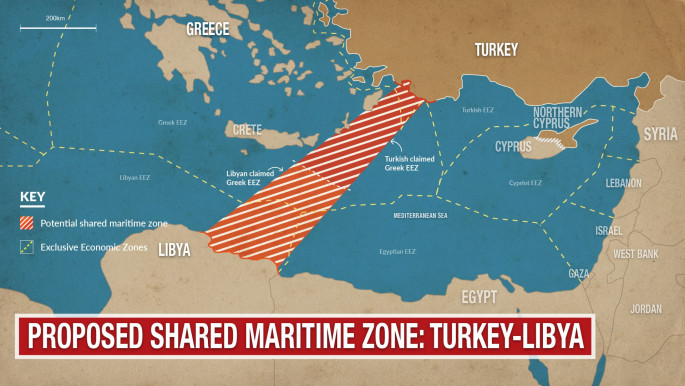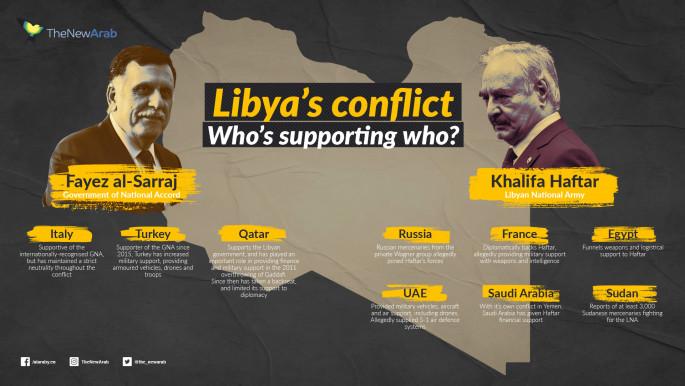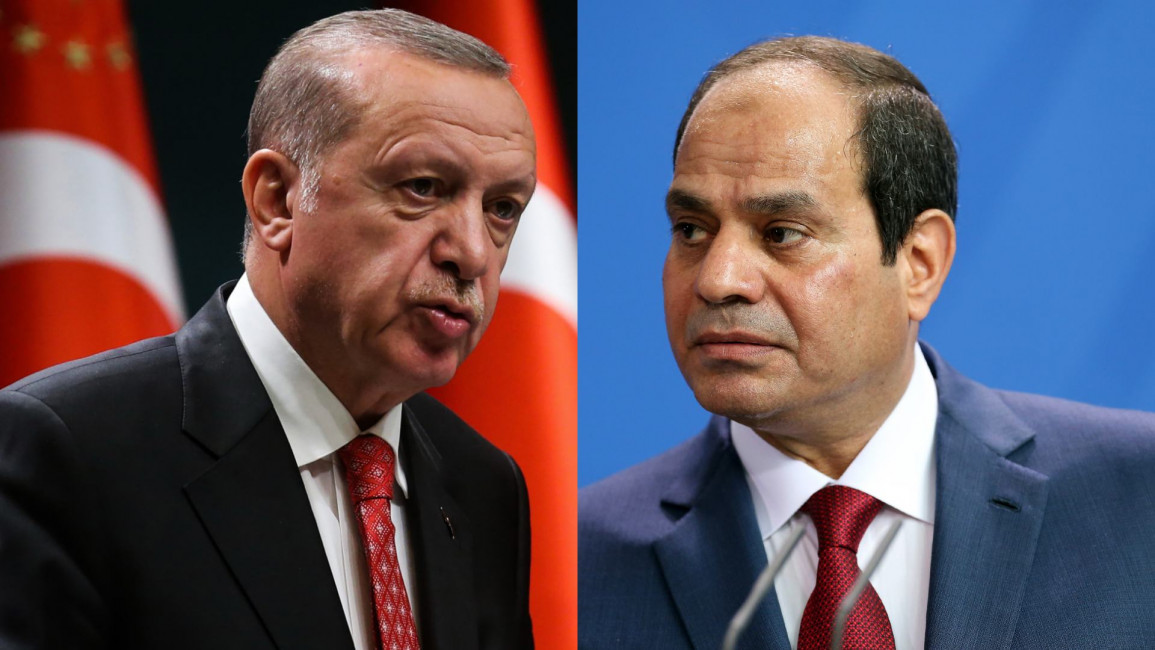Hints of rapprochement between rivals Egypt and Turkey, explained
Hints of rapprochement between rivals Egypt and Turkey, explained
Behind-the-scenes talks indicate warming ties between longtime rivals Egypt and Turkey but Emirati influence over Cairo looks to hamper negotiations.
3 min read
Erdogan and Sisi have been staunch rivals since 2013 [Getty]
Turkey may soon be mending ties with a regional rival after years of enmity, with Egypt eyeing incentives in aligning with Ankara in the Libyan conflict and eastern Mediterranean.
Recent reports in Turkish and Arabic media indicate Turkish officials have sought rapprochement with their Egyptian counterparts in recent weeks.
Ankara and Cairo have been embroiled in a bitter rivalry since the 2013 military coup that saw the ousting of Egypt's first democratically elected president, Mohammad Morsi, a key Turkish ally.
Under President Abdel Fattah al-Sisi, Cairo has become increasingly dependent on the financial and political backing of Saudi Arabia and the United Arab Emirates. That same dependency has deepened the rift with Turkey amid an intense geopolitical standoff between Ankara and the Gulf powers.
Nowhere is that rivalry more clear than Libya, where Egypt and its Gulf allies back rogue general Khalifa Haftar in his bid to topple the United Nations-backed Government of National Accord (GNA).
Ankara inked two key deals with the Tripoli-based government last year, one promising its military support in the conflict and another delineating maritime boundaries in the contentious eastern Mediterranean.
A surprise at the time of their signing, these pacts may now lead to the thawing of relations between Turkey and Egypt, analysts say.
Common interests
"Egypt's interests in the east Mediterranean and Libya are clearly in line with those of Turkey," said Dr. Ali Bakeer, an Ankara-based political analyst.
Ongoing negotiations with Greece could see Egypt lose around 10,000 square kilometres in the energy resource-rich eastern Mediterranean, according to Bakeer.
Signing on the Tripoli-Ankara pact could even be a net gain for Cairo, he added.
"There is no logical reason to assume that Cairo would want to relinquish vast maritime territory and enter into conflict with Turkey just for the sake of ideological confrontation," Bakeer told The New Arab on Wednesday.
The ideological rift stoked by Cairo's Emirati and Saudi backers is severe, however, and has reportedly led Sisi to reject requests to cooperate with Ankara in the eastern Mediterranean.
Financial incentives
In Libya too, Egypt has backed the opposing side to Turkey, providing training and other forms of military support to Haftar's self-styled Libyan National Army (LNA).
In recent months, the tide of the conflict has turned, with Turkish military and financial backing securing major gains for the Tripoli-based GNA.
A string of losses for ally Haftar and shrinking financial support from Gulf allies amid the coronavirus crisis may see Sisi warm to his longtime rival, Turkish President Recep Tayyip Erdogan.
In addition to accessing energy resources through a maritime coordination deal, securing a stable neighbour in Libya will provide Egypt's crumbling economy with fresh opportunities and reduced security risks.
"Both Riyadh and Abu Dhabi are less capable now of financing Egypt than before, and the [Sisi] regime has an interest to diversify its relations and financial sources to avoid being used as a tool," Bakeer explained.
"Relations with Turkey based on common interests rather than on ideological confrontation can offer such an opportunity," he said.
Bakeer's insights were reflected in a statement by a senior official in Turkey's ruling Justice and Development Party (AKP) said on Monday.
"The UAE is behind the differences Turkey has with Egypt," said Yasin Aktay, adviser to the AKP president. "Turkey and Egypt have common interests in the waters of the Mediterranean.
"Lets take a blind eye to the disagreements between the two countries and look towards our common interests. When we have a dispute on one issue, it doesn't mean we have to be enemies on all other issues."
Mel Plant is a journalist for The New Arab. Follow her on Twitter: @meleppo
Follow us on Facebook, Twitter and Instagram to stay connected
Recent reports in Turkish and Arabic media indicate Turkish officials have sought rapprochement with their Egyptian counterparts in recent weeks.
Ankara and Cairo have been embroiled in a bitter rivalry since the 2013 military coup that saw the ousting of Egypt's first democratically elected president, Mohammad Morsi, a key Turkish ally.
Under President Abdel Fattah al-Sisi, Cairo has become increasingly dependent on the financial and political backing of Saudi Arabia and the United Arab Emirates. That same dependency has deepened the rift with Turkey amid an intense geopolitical standoff between Ankara and the Gulf powers.
Nowhere is that rivalry more clear than Libya, where Egypt and its Gulf allies back rogue general Khalifa Haftar in his bid to topple the United Nations-backed Government of National Accord (GNA).
Ankara inked two key deals with the Tripoli-based government last year, one promising its military support in the conflict and another delineating maritime boundaries in the contentious eastern Mediterranean.
A surprise at the time of their signing, these pacts may now lead to the thawing of relations between Turkey and Egypt, analysts say.
Common interests
"Egypt's interests in the east Mediterranean and Libya are clearly in line with those of Turkey," said Dr. Ali Bakeer, an Ankara-based political analyst.
 |
| [Click to enlarge] |
Ongoing negotiations with Greece could see Egypt lose around 10,000 square kilometres in the energy resource-rich eastern Mediterranean, according to Bakeer.
Signing on the Tripoli-Ankara pact could even be a net gain for Cairo, he added.
"There is no logical reason to assume that Cairo would want to relinquish vast maritime territory and enter into conflict with Turkey just for the sake of ideological confrontation," Bakeer told The New Arab on Wednesday.
The ideological rift stoked by Cairo's Emirati and Saudi backers is severe, however, and has reportedly led Sisi to reject requests to cooperate with Ankara in the eastern Mediterranean.
Financial incentives
In Libya too, Egypt has backed the opposing side to Turkey, providing training and other forms of military support to Haftar's self-styled Libyan National Army (LNA).
In recent months, the tide of the conflict has turned, with Turkish military and financial backing securing major gains for the Tripoli-based GNA.
A string of losses for ally Haftar and shrinking financial support from Gulf allies amid the coronavirus crisis may see Sisi warm to his longtime rival, Turkish President Recep Tayyip Erdogan.
In addition to accessing energy resources through a maritime coordination deal, securing a stable neighbour in Libya will provide Egypt's crumbling economy with fresh opportunities and reduced security risks.
 |
| [Click to enlarge] |
"Both Riyadh and Abu Dhabi are less capable now of financing Egypt than before, and the [Sisi] regime has an interest to diversify its relations and financial sources to avoid being used as a tool," Bakeer explained.
"Relations with Turkey based on common interests rather than on ideological confrontation can offer such an opportunity," he said.
Bakeer's insights were reflected in a statement by a senior official in Turkey's ruling Justice and Development Party (AKP) said on Monday.
"The UAE is behind the differences Turkey has with Egypt," said Yasin Aktay, adviser to the AKP president. "Turkey and Egypt have common interests in the waters of the Mediterranean.
"Lets take a blind eye to the disagreements between the two countries and look towards our common interests. When we have a dispute on one issue, it doesn't mean we have to be enemies on all other issues."
Mel Plant is a journalist for The New Arab. Follow her on Twitter: @meleppo
Follow us on Facebook, Twitter and Instagram to stay connected


![Minnesota Tim Walz is working to court Muslim voters. [Getty]](/sites/default/files/styles/image_684x385/public/2169747529.jpeg?h=a5f2f23a&itok=b63Wif2V)




![Debris near Rafic Hariri International Airport [Getty]](/sites/default/files/styles/image_212x120/public/2176162423.jpeg?h=a5f2f23a&itok=XLiO6WHk)
![An Israeli air strike on Jabalia killed teenage journalist Hassan Hamad [Screengrab/X]](/sites/default/files/styles/image_212x120/public/2024-10/hassan%20hamad1.jpg?h=c12e0b96&itok=KstD_5xk)
